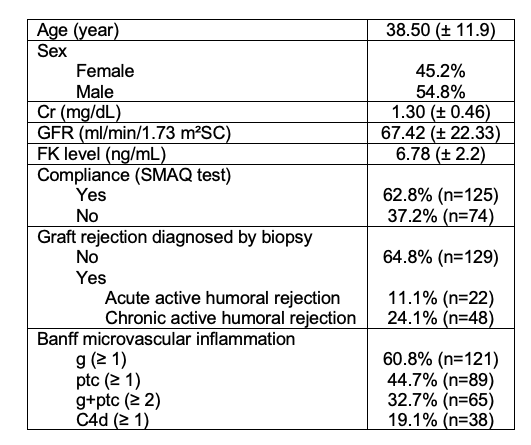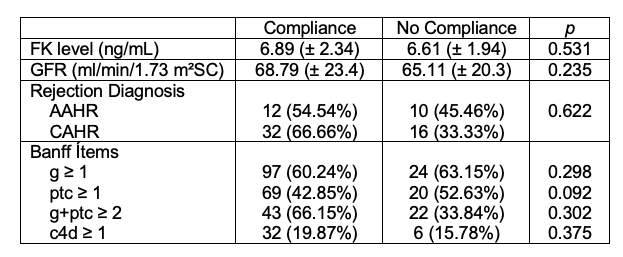Lucino Bahena Carrera, Mexico has been granted the TTS Scientific Congress Award

Immunosuppressive medication adherence´s association with microvascular inflammation in protocol biopsies in a kidney transplant mexican population
Lucino Bahena Carrera1, Cielo Patricia Muñoz Olvera1, Adán Rodríguez García1, Rocío Estéfany López Sánchez1, Luis Ignacio Manzo Arellano1, Christian Francisco Arce Millán1, Héctor Faustino Noyola Villalobos1, Carlos Adrián Chávez Mendoza1.
1Nephrology and Transplant, Central Military Hospital, Mexico City, , Mexico
Introduction: Non-adherence to immunosuppressive treatment is a major cause of graft failure, development of de novo donor-specific antibodies and increased costs due to readmission to dialysis. Among the strategies to evaluate adherence to immunosuppression are adherence tests.
To determine adherence to treatment, the simplified medication adherence questionnaire (SMAQ) was used, validated in spanish language for use in kidney transplant patients. Ortega SF reported non-adherence in 39.01% of patients with at least 1 year post-kidney transplant in the spanish population.
Method: Observational, analytical, transversal and prospective study from January 2018 to February 2023. Were included all G5 KDIGO chronic kidney patients who were transplanted at Central Military Hospital, Mexico, City and were eliminated subjects denied informed consent. When the patients were 5 years post-transplant, they underwent renal biopsy protocol, which was histologically analyzed using the Banff score and at the same time the Simplified Medication Adherence Questionnaire was applied. The Kolmogorov-Smirnov test was performed to determine the normality of the variables, descriptive and analytical statistics were performed with Xi² and Mann-Whitney tests; p< 0.05 was statistically significant.
Results: Were included 199 kidney transplant recipients. Non-compliance prevalence 5 years post-transplant in our mexican population was 37.2%. Our transplant recipients are young. There weren´t subtherapeutic tacrolimus levels.

On average, transplant patients don´t have chronic graft dysfunction. Subclinical humoral rejection (acute or chronic) was diagnosed in 35.2% of the patients and microvascular inflammation in 32.7%, both determined in renal biopsies per protocol.

Discussion: Our results are similar to reported in 2019 by Al-Sheyyab A et al in 182 kidney transplant patients, where 39% were non-compliance and there were no differences in the Banff grade or the presence of antibody-mediated rejection between the 2 groups; however, they are different from what was published by Lerut E et al where he concluded that non-adherent patients have greater c4d, tubular damage and peritubular capilaritis.
Conclusion: The non-compliance rate in our transplant population was 37.2%. We didn´t find a statistically significant association between treatment adherence measured by the SMAQ test and microvascular inflammation determined in protocol renal biopsies. We need to apply the Basel Assessment of Adherence to Immunosuppressive Medications Scale (BAASIS©) to test adherence or apply the SMAQ test to patients with biopsies by indication to evaluate better test´s discrimination.
[1] Kidney Trasplant
[2] Adherence test
[3] Immunosuppression Adherence
[4] Microvascular inflammation
[5] Protocol Biopsies
